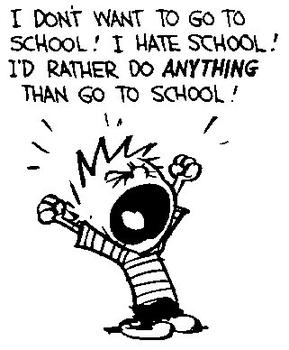
As a result they leave school able to obey rules and pass examinations but totally unprepared for the tasks of adult life. Young people are taught to incorporate and reproduce knowledge, rather than to develop their own initiative and interests. Schools, she argues, are harsh and emotionally abusive institutions which are structured to engender conformity and compliance. Is social control the purpose of secondary education? Do high schools exist primarily to keep strong and energetic young people off the streets until they are old enough to get a job? Grace Llewellyn is an ex-teacher and in her book, The Teenage Liberation Handbook-How to quit school and get a real life and education, 1 believes that this is the case. This kind of coercion reminds me of the military psychiatry of the first world war, that aimed to get combat traumatised infantry back in the trenches as soon as possible. This cannot be right, I thought to myself. This had involved three of them wrestling the screaming, struggling young woman out of her parents’ car and dragging her into the school like an animal to the slaughter: not once, but every day for weeks, until the girl realised she had lost her battle. The psychiatrist had persuaded her to help the parents to get the girl into her classroom. She told me of her last encounter with a child psychiatrist, who had treated a teenage pupil of hers who was refusing to attend school. I recently visited a prospective new school for my daughter, and the head was interested to learn of my profession. The traditional treatment for school phobia is to get the child back to school as soon as possible. Instead, I hear stories of frightening playgrounds, friends who taunt them, steal their personal possessions, even assault them, lessons that are at best dull and irrelevant to their lives, and at worst chaotic and noisy environments, where the teachers either withdraw apathetically or resort to control by humiliation and sarcasm. There is no irrational fear of an innocuous stimulus.

When I encounter teenagers who are not going to school, they will often be able to articulate understandable reasons for non-attendance, and the classic label of school phobia does not seem to fit in the way that it does with younger children.

This seems to be especially true of secondary schools, which are much less nurturing and less fun than primary schools.

But not all children enjoy school, and many do not feel that they are learning anything useful.

They are 4 and 7, and they seem to enjoy the social and intellectual stimulation of school.


 0 kommentar(er)
0 kommentar(er)
